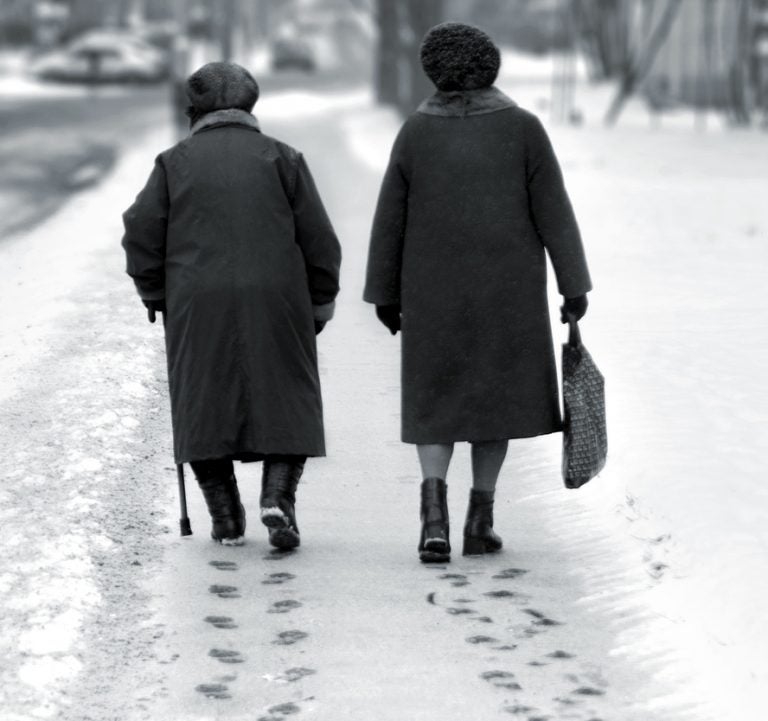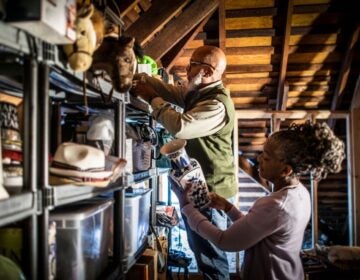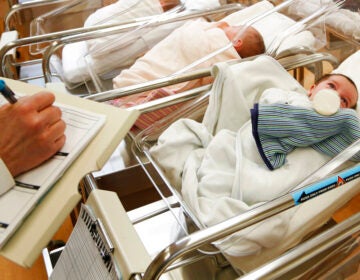Old age can be harmful to your health
Mother Nature loves to give and gives generously. Anything that she's given, though, she’ll manage to get back later.

When did I lose the spring in my step, the ability to sleep through the night and wake up refreshed? When did I start to shuffle, to lean forward, clutching the handles of a walker, unable to turn my head to see what’s going on behind me? (BigStock)
The Chinese like to depict life during the precarious and ephemeral old age as “candle in the wind and frost on the grass.”
I first encountered this pair of clichés when I was in elementary school in Shanghai. Oh really? I remember shrugging at the time, uncomprehending how anyone could allow himself to get to that pitiful stage.
Now I can speak from personal experience — I am a withered leaf desperately clinging to a bare branch in the dead of winter.
American culture offers its own characteristically pragmatic wisdom on this subject: “Don’t buy green bananas,” and “Live every day as though it were your last.”
If every day is, indeed, my last, should I bother refilling my prescriptions? Should I do my laundry, or pay my rent at the senior living center?
I end up compromising with my own homegrown solution. If there’s a chore that can be postponed until tomorrow, I won’t do it today. If there’s a pleasure I can indulge in today, I won’t wait until tomorrow.
Along the way I have come up with two significant and related insights: Old age is harmful to your health, and Mother Nature is out to get you.
I find it astonishing, for example, that I used to walk everywhere with my own two feet, even up and down stairs, without having to hug the banister for dear life. In fact, I did it for some 80 years — until recently — without marveling at my confidence in my two spindly legs.
Gradually and imperceptibly, my sense of balance has evaporated, which means that I just lost a crucial battle in the game of Tug of War with Mother Nature. I never volunteered to play in that game, of course. Who relishes participating in an unjust game you are destined to lose? The only suspense remaining to the repeated and eventual loser is the when and the how.
Not to be gloomy about the whole procedure — I’ve had a fairly long life, for heaven’s sake. It’s been a challenging but nevertheless satisfying life for the most part.
Now, however, Nature is reminding me in numerous unsubtle ways that it’s time to go.
As T.S. Eliot so elegantly put it, “I have seen the eternal Footman hold my coat, and snicker.”
Presents with no future
Mother Nature loves to give and gives generously. Anything that she’s given, though, she’ll manage to get back later.
From the instant I drew my first breath, I was given parents, a sibling, sundry relatives, and later, an education and friends. Then I acquired a spouse and children.
I considered everything I received my due and didn’t question any of it — until my series of gains began to turn into losses.
When did I lose the spring in my step, the ability to sleep through the night and wake up refreshed? When did I start to shuffle, to lean forward, clutching the handles of a walker, unable to turn my head to see what’s going on behind me?
To keep myself minimally functional, I took to cutting corners, like reusing a pot without washing it (in the same spirit of our government requiring soldiers to do a second or third tour of duty). Unfortunately, I soon discovered that there are only a finite number of corners one can cut, and each one only saves a few minutes of work.
What’s worse, corners have the disagreeable tendency of accumulating.
Mother Nature steals from you a little at a time so you don’t notice — at least, not at first. Everything gradually looks dimmer. It becomes harder to differentiate numerals like 5, 6, 8, and 9. People around you no longer enunciate; they start to mumble. Food doesn’t taste as it used to. Getting up from a chair takes too much effort.
Nature will ambush you anywhere and take anything from you, the tangible and the not-so-tangible. Before you have a chance to adjust to the losses, to the “new normal,” here comes a precipitous drop, and you’re in a new-new normal, and on and on it goes. You can never second-guess what she’s going to do next; only one thing is certain — the other shoe will drop.
Your world just keeps shrinking, to a room with a bed, and a desk and chair, leaving you ruminating, What’s left of my life? Is it still a life?
I once saw a movie where the character reflects: “In youth, we live as if we were immortal. Knowledge of mortality capers around us like a brittle paper ribbon that barely touches our skin. When in life does that change? When does the ribbon tighten until it finally strangles us?”
When it’s time, of course.
Wait! Who just tapped me on the shoulder?
What? That snickering eternal Footman, again?
Annabel Liu came to this land on a freighter in 1957. A bilingual writer, she has published three memoirs in English, “My Years as Chang Tsen: Two Wars, One Childhood” (second edition); “Under the Towering Tree: A Daughter’s Memoir”; and “Where Chopsticks Meet Apple Pie: Cross-cultural Musings on Life, Family, and Food.” She has also published a novel and seven collections of essays and short stories in Chinese.
WHYY is your source for fact-based, in-depth journalism and information. As a nonprofit organization, we rely on financial support from readers like you. Please give today.




